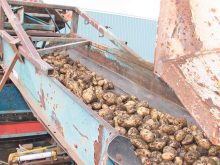While provincial and industry officials worked to contain Manitoba’s first case of porcine epidemic diarrhea (PEDv) this week, attention shifted to a pig plasma feed ingredient as a possible source of transmission.
Landmark Feeds, which is owned by Nutreco, issued a statement late last week saying a plasma-based feed additive for newborn piglets is suspected as a possible source in the Ontario outbreak, which has now spread to 16 farms.
The outbreak on at least 10 of those farms has been linked to a single feed source, which included spray-dried porcine-origin plasma ingredients.
Read Also

Global humanitarian aid slashed by one-third
Humanitarian aid around the world was cut by a third in 2025 and Canada is one of the culprits.
“This concern was raised as a way of explaining how multiple farms without close geographic or other epidemiological connections could become infected in such a short time,” the Landmark statement said.
The link has not been confirmed, but in the meantime, the company said it will only be sourcing the feed additive from Canadian suppliers and it will be testing all of its plasma for the presence of PEDv RNA prior to using it in feed.
“Sources of plasma protein from the United States of America may be sourced from slaughter plants where pigs previously infected with PEDv are handled,” the company said. “Canadian slaughter plant sources of plasma protein do not contain plasma from infected pigs as the virus was only detected in Canada (Ontario) for the first time about three weeks ago.”
Valuable feed ingredient
As well, it said customers that preferred not to use the plasma product at all in their piglet rations would be supplied with alternatives, but the company warned “piglet performance may be compromised and cost of diets may increase.”
“Spray-dried plasma protein is a highly valuable and effective feed ingredient in baby pig diets, encouraging feed intake and better post-weaning performance,” the statement says. “The spray-dry process used to dry plasma ingredients is able to destroy all recognized swine pathogens.”
Local officials said their first priority is preventing the virus from spreading to more farms in Manitoba.
“Secondarily, they will be investigating the route of infection on to the farm,” a provincial spokesperson said Feb. 18. “They may be looking (at plasma) as well, but as I understand it, it’s not currently their focus.”
“We’re guided by our veterinarians. If they tell us there’s a problem with blood plasma, then we’ll pass that on to our producer members,” said Manitoba Pork Council general manager Andrew Dickson.
Pinpointing the exact source of infection is a “big detective project,” he said, because it could have arrived via trucks, service personnel, feed or some other way.
“There’s been a lot of finger pointing and speculation, and that’s why you’re seeing companies like Landmark going out of its way to have its products tested to see if it contains the virus and whether it’s a potential source of infection for farms.”
However, Ontario’s chief veterinarian Dr. Greg Douglas was quoted Feb. 13 on Better Farming magazine’s website as saying the provincial Agriculture Department had detected PEDv genetic material in swine feed samples from several farms confirmed to have the virus. The Canadian Food Inspection Agency, he added, had offered to test for infectivity in those samples.First case
Officials quoted in the same story emphasized that finding genetic material is not the same as finding a live virus.
Manitoba’s only known case to date is on a wean-to-finish farm in southeastern Manitoba.
“The veterinarian and the producer are working very hard to implement measures on the farm to make sure it doesn’t spread off the farm,” said Dr. Glen Duizer, the province’s acting chief veterinary officer. All animal movement on and off the affected farm has been restricted.
Now staff from the chief vet’s office are working to identify any and all farms that may have had contact with the affected operation so they can be surveilled for signs of the virus that causes PED.
How the virus arrived at the farm is still unknown. It is believed to be transmitted via fecal matter.
“This strain has not been identified yet, fully, that’s a process that’s underway… in Canada and North America so far it’s been one strain, there is an additional strain now present in the U.S., but in Canada it’s all been one strain,” Duizer said.
The virus’s arrival was an unwelcome one for the Manitoba Pork Council, but not unexpected.
“The council feels it’s very unfortunate we’ve had this case, but we’re not surprised, we’ve been planning for this eventuality,” said Dickson. “We’re working very closely with the provincial and the federal government to ensure that this site is isolated and the disease contained on this farm, and we’re supporting all efforts.”
Last fall, the council worked with the province to develop an emergency response plan in the event PED arrived in the province. Then, in the first week of February, they jointly launched a rapid-detection monitoring program for the disease. The program targets facilities that handle large volumes of pigs, but hasn’t detected any signs of the virus yet.
Producers meanwhile have been provided detailed information on the virus, and biosecurity protocols.
Dickson stressed that proper cleaning and disinfecting procedures are vital in order to stop the spread of the virus via livestock trailers.
“What this case has illustrated is the continuing need for producers to be vigilant about what vehicles and what people are coming onto their properties, entry into barns should be severely restricted as well,” he said. “Vehicles must also be washed and disinfected if they come into contact with a potential source of the virus.”
Vigilant
In addition to the confirmed farms in Ontario there is one in Quebec and one on Prince Edward Island. South of the border nearly 300 barns in 23 states have been infected, resulting in the deaths of approximately four million pigs.
If Manitoba — which produces 30 per cent of all the hogs in Canada — saw an outbreak of the disease similar to that seen in the U.S., the industry could lose upwards of $170,000 million, said Dickson.
Duizer added that PED is not currently a reportable disease in the province, but that discussions are underway to change that.

















